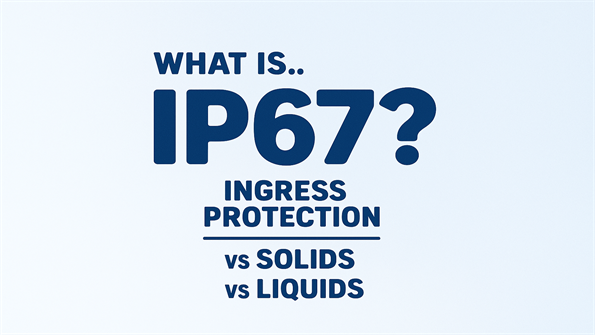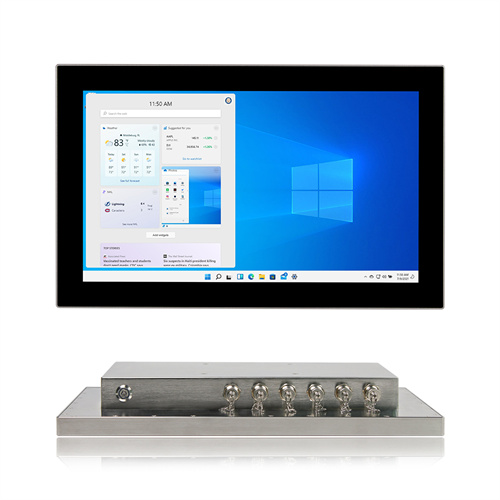What Is IP67 Waterproof and Why It Matters

Think about having a gadget that stays safe if dropped in water or hit by a dust storm. That’s what IP67 waterproofing offers. This rating means the device can block all dust and handle being in water up to one meter deep for 30 minutes.
The IP rating system makes it easy to measure how well devices are protected. It helps you pick gadgets built to handle tough conditions at home or work. For instance, about 60% of U.S. homes with outdoor spaces use strong electronics like waterproof smart TVs. IP67-rated gadgets are perfect for these needs, working well in humid, rainy, or tough weather areas.
What is an IP rating?
An IP rating shows how well a device keeps out dust and water. It’s a worldwide standard set by the International Electrotechnical Commission (IEC) under the IEC 60529 rules. This system helps you know how safe your gadgets are from things like dirt, water, or even being underwater.
The term "IP" stands for "Ingress Protection," which is a standard used to define the levels of sealing effectiveness of electrical enclosures against intrusion from foreign bodies and moisture. The IP67 rating is part of the IP code, a system devised by the International Electrotechnical Commission (IEC).
Breaking Down IP67
- • IP: This stands for "Ingress Protection."
- • 6: The first digit indicates the level of protection against solid objects, such as dust. A "6" rating means the device is completely dust-tight.
- • 7: The second digit indicates the level of protection against liquids. A "7" rating means the device can be submerged in water up to 1 meter (approximately 3.3 feet) deep for up to 30 minutes without being damaged.
What Do the Numbers in an IP Rating Mean?
An IP rating like IP67 uses two numbers to show how well a device resists dust and water. Knowing what these numbers mean helps you pick the right gadget.
The First Number: Dust Blocking
The first number tells how much solid stuff, like dust, a device can keep out. It ranges from 0 to 6, with 6 being the best. A "6" means no dust can get inside and harm the device. This is great for gadgets used in dusty places like deserts or construction sites.
Here’s a simple chart for the first number:
| First Number | What It Protects Against |
| 0 | No protection from solid particles |
| 1-4 | Stops big objects, but not small dust |
| 5 | Some dust can enter, but not much |
| 6 | Completely blocks all dust |
The Second Number: Water Safety
The second number shows how well a device handles water. It ranges from 0 to 9, with higher numbers offering better safety. A "7" means the device can stay underwater up to 1 meter deep for 30 minutes. This makes it useful for rainy days or accidental drops in water.
Here’s a quick guide for the second number:
| Second Number | Water Protection Level |
| 0 | No water protection |
| 1-4 | Handles splashes or light sprays |
| 5-6 | Safe from gentle water jets |
| 7 | Can be underwater for 30 minutes |
| 8-9 | Resists strong water pressure |
By learning these numbers, you can choose gadgets that fit your needs. Whether it’s a phone or heavy-duty equipment, the IP rating tells you what it can handle.
Why is Water Resistance Important?
Water resistance is a crucial feature for electronic devices, especially those that are frequently used outdoors or in environments where water exposure is likely. This includes smartphones, smartwatches, cameras, and more. A water-resistant device ensures that accidental spills, rain, or even brief submersion do not lead to costly repairs or replacements.
Everyday Scenarios
Consider the following scenarios where an IP67 rating proves beneficial:
- 1. Caught in the Rain: Imagine you're caught in a sudden downpour while hiking or commuting. Your IP67-rated smartphone will continue to function without a hitch, allowing you to use navigation apps or make calls without worry.
- 2. Poolside Adventures: Whether you're lounging by the pool or playing with water balloons in the backyard, an IP67-rated device can handle splashes and brief dips without suffering damage.
- 3. Dusty Environments: If you work in construction or enjoy outdoor activities like biking through trails, the dust-tight feature of an IP67-rated device ensures that dust particles won't interfere with functionality.
Waterproof Features of IP67
What IP67 Waterproofing Includes
IP67 waterproofing keeps devices safe from dust and water. It means the device is fully dustproof and can stay underwater up to 1 meter deep for 30 minutes. This makes IP67 devices great for tough places where dust and water are common.
You can trust IP67 devices in many situations, such as:
- • Outdoor setups, where rain or dust storms happen often.
- • Factory areas, where machines face dust and moisture.
- • Boat use, where splashes or short dips in water occur.
This protection keeps devices working even in rough conditions.
Limits and Special Conditions
IP67 waterproofing works well but has limits. It’s tested under controlled conditions, so real-life use might differ. For example, long water exposure or strong water jets can go beyond what IP67 can handle.
IP67 devices go through strict tests like pressure checks and temperature tracking. These tests make sure no dust or water gets inside. But if you go deeper or longer than allowed, water can get in and harm the device. Always use IP67 devices within their limits to keep them safe.
Misunderstandings About IP67
Some people think IP67 means devices are always waterproof. Actually, it only protects against water up to 1 meter deep for 30 minutes. It doesn’t op damage from strong water jets or long underwater use.
Another mistake is thinking IP67 devices can’t break. While they’re tough, they can still be harmed by chemicals or hard hits. For example, sharp impacts or corrosive substances can ruin the device.
Here’s what you should know about IP67:
- 1. It gives the best dust protection (blocks all dust).
- 2. It resists water well but isn’t made for strong jets or long underwater use.
- 3. It doesn’t protect against extreme heat, cold, or chemicals.
By knowing these limits, you can use IP67 devices wisely and keep them working longer.
Why IP67 Matters
-
1. Protection from Environmental Damage
IP67-certified devices keep electronics safe from dust and water. Dust can harm gadgets, but IP67 stops all dust from entering. It also protects against water up to 1 meter deep for 30 minutes. This makes devices reliable in tough conditions.
Many industries use IP67 devices to stay efficient. For example:
- • Electric cars use IP67 power supplies to handle bad weather.
- • Smart home cameras need IP67 to block dust and moisture.
- • Outdoor telecom equipment uses IP67 to keep working in rain or dirt.
Choosing IP67-rated gadgets keeps them safe and working in harsh places.
-
2. Boosting Durability and Lifespan
IP67 devices are made to last longer. They stop dust and water from getting inside, reducing damage. This helps devices work longer and saves money on replacements.
Research shows IP67 batteries work well with some water exposure. They block all dust and survive short dips in water. Picking the right IP rating for your needs makes gadgets last longer.
For long-term use, IP67 devices are great. They handle temperature changes and work well for years, making them perfect for important tasks.
-
3. Used in Many Industries
IP67 devices are useful in many fields. Their dust and water resistance make them great for outdoor and industrial jobs. You’ll find them in:
- • Solar panels and wind turbines, where weather is a challenge.
- • IoT tools in factories, working in dusty or wet places.
- • Car systems, staying reliable in rain or muddy areas.
These devices work in different settings, showing their value. Whether for tough jobs or outdoor fun, IP67 gadgets are dependable.
Comparing IP67 to Other Standards
- • IP67: Fully blocks dust and handles water up to 1 meter deep for 30 minutes. It’s great for outdoor gadgets and tools in dusty or rainy places.
- • IP66: Also blocks all dust but resists strong water jets instead of being submerged. This is perfect for devices cleaned with high-pressure sprays.
- • IP69K: Offers the best water resistance, standing up to hot, high-pressure water jets. It’s often used in industries like food processing, where cleanliness is key.
-
• IP65: Provides protection against low-pressure water jets from any direction and is dust-tight. However, it does not protect against submersion.
- • IP68: Offers protection against continuous immersion in water beyond 1 meter, making it suitable for more extreme conditions than IP67.
Choosing the Right Rating for Your Needs
To pick the right IP rating, think about where you’ll use your device. Will it face dust, water sprays, or full immersion?
- • Use IP67 for gadgets in dusty or rainy outdoor areas.
- • Choose IP66 or IP69K for devices cleaned with water jets.
- • For extreme conditions, combine IP ratings with other tests like MIL-STD-810.
By matching the rating to your needs, you keep your device safe and working well.
InnoAioT‘s IP67-Rated Computing Solutions
WPC-Celeron J1900/J6412 Series IP67 Waterproof Computers
The WPC-Celeron J1900/J6412 Series waterproof computers are built for tough places. It powered by Intel Celeron J1900/J6412 CPU, this industrial-grade system combines efficient performance with robust protection. They work well in areas with lots of dust or water. These computers are made for industries needing strong and reliable devices. The IP67 rating means no dust or water can get inside. This lets the computer work even in dusty sites or wet outdoor spots. Makers test these computers carefully to meet IP67 rules. Tests copy real-life situations to check for dust, water, and other fluids.
The WPC-Celeron J1900/J6412 Series is tough and has smart features. It uses a fanless design, which stops moving parts from breaking. This design also makes it quiet, perfect for places needing less noise. With Intel Celeron processors, these computers run well and save energy. The IP67 enclosure keeps parts safe, making them last longer. Whether you work outdoors, on farms, or in factories, this series is a great choice.
Need a computer for hard conditions? Pick the WPC-Celeron J1900/J6412 Series waterproof panel PCs. Its IP67 rating protects it, and its smart design keeps it running smoothly.

Learning about IP67 waterproofing helps you pick strong devices. This rating stops all dust and resists water up to 1 meter deep for 30 minutes. It keeps gadgets safe by protecting their electrical parts. Knowing IP ratings helps you choose products that are durable and reliable.
FAQ
What does IP67 mean in simple words?
IP67 means your device is safe from all dust. It can also stay underwater up to 1 meter deep for 30 minutes. This rating shows it’s tough and works well in hard conditions.
Can IP67 devices handle heavy rain?
Yes, IP67 devices can handle heavy rain easily. They are waterproof and great for outdoor use. But don’t keep them underwater too long or spray them with strong water jets.
Is IP67 the best waterproof rating?
Not really. IP67 is great, but higher ratings like IP68 or IP69K are better. For example, IP68 works for longer underwater use. IP69K can handle hot, high-pressure water sprays.
Are IP67 devices good for swimming?
No, IP67 devices are not made for swimming. They can handle quick drops in water or short dips. For swimming, choose devices with an IP68 rating.
How do I take care of an IP67 device?
Keep the seals clean and unbroken. Don’t expose it to chemicals or extreme conditions. Check for damage often to keep it dustproof and waterproof.
